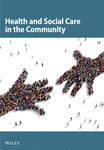New kinds of care, new kinds of relationships: how purchasing services affects relationships in giving and receiving personal assistance
Abstract
This paper draws on interviews with users of direct payments and focus group discussions with the personal assistants (PAs) who assist them with personal and daily living activities. It discusses the benefits and the drawbacks of directly employing such assistance, from the perspectives of both the purchasers and the providers of these services. The paper shows that direct payments can enable disabled people to purchase a much wider range of flexible help, better continuity, greater control and an enhanced quality of life, compared with conventional services. PAs also valued the trust and close relationships they developed with their employers. However, these benefits were much less marked when direct payment users recruited and employed personal assistants through care agencies. On the other hand, both direct payment users and PAs also sometimes experienced difficulties in managing the relationships between them. Some of these problems could be alleviated by changes in the support provided by direct payment schemes themselves; other difficulties were more intractable and arose from the nature of the work and the close relationships which it entailed. The paper recommends a number of measures which could reduce the risks and vulnerability of both disabled direct payment users and personal assistants, without reducing the enhanced quality of life which direct payments can confer.




